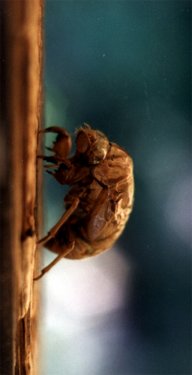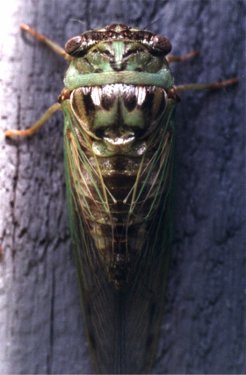Cicada
by Valerie (September 5, 2000)
Related to leafhoppers, treehoppers and spittlebugs, cicadas are much bigger and much noisier. They are the loudest sounding insects during the summer, and at times the noise level from a large number of cicadas is rather high. There is a type of cicada in Australia that is possibly the loudest of any insect. Because of their large size, they are one of the easiest insects to watch metamorphose from larva to adult. The larvae spend several years underground, then emerge to mate and lay eggs in a short period of time.


The two types of cicadas in the U.S. are the periodic and the annual. The annual are green and the periodic are black and red. Here in Texas we always see and hear annual cicadas, but in 17 years, I have not witnessed the spectacular occurrence of the periodic species (there are 17 and 13 year varieties). However, I did see it happen twice in Illinois and it is not easy to forget. The cicadas cover everything and are everywhere, while birds, turtles, and dogs gorge themselves on them. They must be very tasty to dogs, since even our present dog, Frisky, who is not really keen on eating most insects, will devour cicadas with relish. When we find a larva crawling about, we usually bring it into the house so we can watch its transformation. We put it up high, out of Frisky's reach because she will eat it in one gulp, and she will sit at attention for a half hour, in eager anticipation, while the insect slowly climbs out of its shell. The cicada that was photographed here was only about four feet up on the side of the house and while I was advancing the film for a second shot, Frisky jumped up unexpectedly and ate my subject. Cicada larva have the urge to climb before they metamorphose, since their heavy body weight makes it very difficult for them to get airborne from the ground. Some will climb high up in trees and others will make it only a foot or two off the ground before they transform. More often than the live insects, we find their discarded larval shells. The photo here is of a shell left clinging to a fence post after its owner had dried its wings and flown off. |